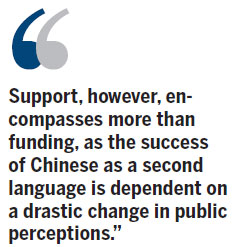Ethnic minorities deserve help with Chinese education
Updated: 2014-06-06 05:11
By Vera Lim(HK Edition)
|
|||||||||
Ethnic minority citizens of Hong Kong have been given a rough deal, especially with regard to education. In a city where communicating in Cantonese and knowing how to read and write in Chinese is the norm, the inability to do so leaves them trapped at the bottom of the socio-economic ladder. Many professional and service jobs are out of reach. Only about 10 percent of minority students have the opportunity to enter a local university. And for that 10 percent, the Chinese language will remain their biggest obstacle to success. Minority students and their families recognize the importance of Chinese, yet without the right support system to aid them in learning the language - supposedly the most difficult in the world owing to its complicated characters - they are rendered helpless.
Their school choices are limited due to their lack of Chinese proficiency - minority students only have 31 "designated schools" from which to choose. They are then taught a simpler, school-based, Chinese curriculum which is far from adequate in preparing them for the workplace. This has in turn resulted in racial segregation.
The label "designated school" may have been removed, but nothing changes as long as the majority of a school's students are drawn from among the ethnic minorities. Without Chinese friends with whom to practice their Cantonese, these students will have little opportunity to use the language and develop fluency. Furthermore, it is common for students from these schools to take the easier GCSE (General Certificate of Secondary Education) Chinese examination - equivalent to the local Primary 3 level of Chinese. This in turn places them at a distinct disadvantage in higher education and subsequently in employment, since a GCSE or GCE (General Certificate of Education) in Chinese is insufficient to qualify them for the civil service and other professional jobs.

For the ethnic minority citizens of Hong Kong, the government's decision to implement a new subject, "Chinese as a second language", is a welcome move. The goals of introducing this new subject are excellent. The aim is to enable non-Chinese speaking students to join mainstream Chinese language classes and take the Chinese-language HKDSE (Hong Kong Diploma of Secondary Education) exam with their Chinese peers. The planned incentive of providing additional funding for all schools admitting 10 or more non-Chinese speaking students, as outlined in the policy, is a step in the right direction; one of the hindrances these students face in mainstream schools is the latter's lack of support in bridging the language gap. With more funding comes better resources, student welfare and support services, and the intensive extra classes needed to get these students up to speed in the Chinese language.
Support, however, encompasses more than funding, as the success of Chinese as a second language is dependent on a drastic change in public perceptions. Ethnic minorities are often viewed as belonging to society's underclass. According to Oxfam Hong Kong, one in seven South Asians are living on social security support. They are often seen as unskilled laborers engaged in low-status occupations such as construction worker, security guard or courier, because their lack of Chinese proficiency leaves even service sector jobs out of their reach. At a recent meeting conducted by ethnic minority advocacy group Unison, it was evident that some teachers carry their bias into the classroom. Minority students cited examples of teachers telling them they were doomed to fail and that their futures would be limited to menial jobs. Chinese lessons for these students are also being dumbed down as teachers keep the lessons simple - sticking to the textbook instead of encouraging interest and discussion, and therefore starving the students of much needed practice in actually using the language.

For Chinese to be taught effectively as a second language, teachers have to leave their unfounded perceptions outside the classroom. Otherwise, students will pick up on their teachers' disinterest and reciprocate accordingly, as I discovered during a teaching stint in Singapore's equivalent of a Band-3 secondary school. The study of English literature had recently been introduced in that school, and under their original teacher the class grew to enjoy the subject. However, the teacher changed, and the new teacher kept the lessons simple as she had little faith in the students' ability to handle literature. As expected, the students grew to dislike the course and ultimately did badly in the national exam, proving her right. For the teaching of any subject to succeed, particularly one as ambitious as Chinese as a second language, the teachers need to foster their students' interest in the subject and believe they can excel in it as well.
As the next academic year is just around the corner, for the sake of those ethnic minority families calling Hong Kong their home, I hope soon to be reading about the success of the new subject.
As an undergraduate the author provided free tuition to underprivileged youth, and taught at a secondary school in Singapore under a summer internship. She also taught at Nanyang Technological University of Singapore as part of her Master's program scholarship and is now teaching as a Visiting Fellow at City University.
(HK Edition 06/06/2014 page9)